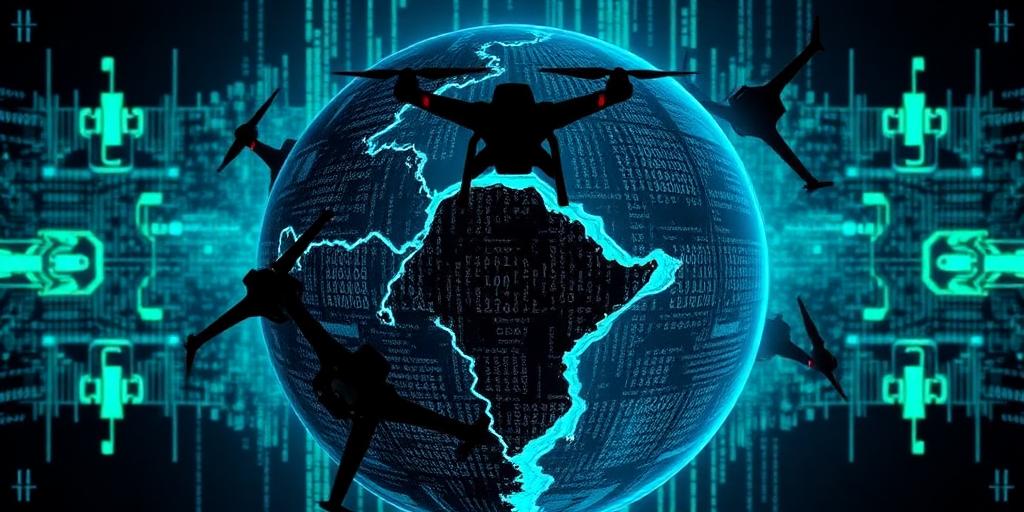The Double-Edged Sword: How Disruptive Technologies are Reshaping Modern Conflict
We live in an era defined by rapid technological advancement. While these innovations promise progress and efficiency in many sectors, their impact on conflict and warfare is complex and often unsettling. Disruptive technologies, characterized by their ability to fundamentally alter existing systems and norms, are reshaping the landscape of modern conflict in profound ways.
What are Disruptive Technologies?
Disruptive technologies are innovations that create a new market and value network, eventually displacing established market-leading firms, products, and alliances. In the context of conflict, these technologies can range from readily available tools to sophisticated military applications. Think of drones, artificial intelligence, social media, and cyber warfare capabilities – all technologies with the power to disrupt traditional power dynamics and strategies.
The Impact: A Multifaceted Analysis
Here's a breakdown of how disruptive technologies are impacting conflict:
- Asymmetrical Warfare: Technologies like drones and cyber weapons empower non-state actors and smaller entities to challenge larger, more established military forces. This levels the playing field, creating new vulnerabilities for traditional powers.
- Information Warfare: Social media platforms and advanced communication technologies have become battlegrounds for information warfare. Disinformation, propaganda, and influence operations can be deployed rapidly and effectively, shaping public opinion and destabilizing societies.
- Autonomous Weapons Systems (AWS): The development of AI-powered autonomous weapons raises serious ethical and strategic questions. The potential for machines to make life-or-death decisions without human intervention raises concerns about accountability, unintended consequences, and the future of warfare.
- Cyber Warfare: Cyberattacks can cripple critical infrastructure, disrupt financial systems, and steal sensitive information. Nation-states and criminal organizations alike are leveraging cyber warfare capabilities to achieve strategic and economic objectives.
- Surveillance and Intelligence: Advanced surveillance technologies, including facial recognition and data analytics, are transforming intelligence gathering. While these tools can enhance security, they also raise concerns about privacy, civil liberties, and the potential for abuse.
Case Studies: Examples in Action
- The Syrian Civil War: Social media has been used extensively for propaganda, recruitment, and documenting human rights abuses. Drones have also played a significant role in reconnaissance and attacks.
- The Russia-Ukraine Conflict: Cyberattacks have been a persistent feature of this conflict, targeting critical infrastructure and government systems. Disinformation campaigns have also been used to shape public opinion and undermine the legitimacy of the opposing side.
- Counter-Terrorism Operations: Drones and surveillance technologies are widely used in counter-terrorism operations, raising ethical concerns about targeted killings and civilian casualties.
Challenges and Opportunities
The integration of disruptive technologies into conflict presents both challenges and opportunities:
Challenges:
- Escalation: The ease of use and availability of some disruptive technologies can lower the threshold for conflict, increasing the risk of escalation.
- Attribution: Identifying the perpetrators of cyberattacks and disinformation campaigns can be difficult, making it challenging to hold actors accountable.
- Ethical Concerns: The use of autonomous weapons and surveillance technologies raises serious ethical questions about the future of warfare and human rights.
Opportunities:
- Enhanced Situational Awareness: Advanced sensors and data analytics can provide military forces with better situational awareness, improving decision-making.
- Precision Targeting: Precision-guided weapons can reduce the risk of civilian casualties and minimize collateral damage.
- Peacekeeping and Conflict Resolution: Technology can be used to monitor ceasefires, verify arms control agreements, and facilitate communication between conflicting parties.
Navigating the Future
The impact of disruptive technologies on conflict is only going to intensify in the years to come. It is crucial for policymakers, military leaders, and civil society to understand these technologies and their implications. This includes:
- Developing clear ethical guidelines for the use of autonomous weapons and surveillance technologies.
- Investing in cybersecurity and resilience to protect critical infrastructure from cyberattacks.
- Strengthening international cooperation to address the challenges of disinformation and propaganda.
- Promoting education and awareness about the impact of technology on conflict.
By proactively addressing these challenges and opportunities, we can mitigate the risks and harness the potential of disruptive technologies to promote peace and security.
Conclusion
Disruptive technologies are transforming the nature of conflict, creating both new threats and new opportunities. Understanding these technologies and their implications is essential for navigating the complex landscape of modern warfare and building a more peaceful and secure future.









